Дубна
I was invited to Дубна (Dubna), the hometown of Misha and his roommate Fyodor, for Fyodor’s 24th birthday party. I know these guys through a friend at BU, we had met twice before, and they are certainly good guys, and certainly Russians. Two things I like.When I stepped out of the train, Misha was waiting at the back of the crowd.
Wearing a BU t-shirt.
“I thought you would like my t-shirt.”
“I don’t even own a BU t-shirt.” [I don’t know if I have any evidence that I was ever at BU with me in this country.]
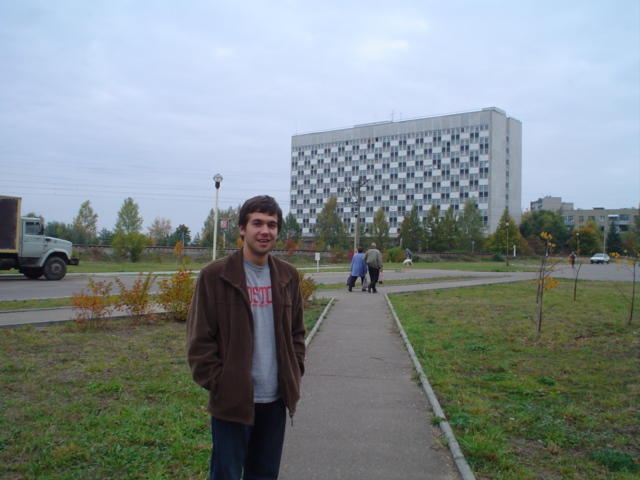
“We’re going to go a swimming pool first. Would you like?”
“Absolutely. Though I don’t have a swimming stuff with me.” I had only brought books to read in the train, which I didn’t read at all, but instead ignored while I sat glued to the window for two hours.
“That’s okayee. I have stuff.”
So I hadn’t been in Misha’s hands for more than 20 minutes, and I was wearing a bathing cap and Speedos.
His Speedos.
And what better way to say: Welcome to the Motherland.
“I hope you don’t mind. In Russia, everyone wears ‘dem.” Yes they certainly do. And here I am. In Russia. Being everyone.
Swimming by their standards consists of about a dozen lazy laps of an Olympic swimming pool. This wasn’t ‘lets go to the pool’ and kick around, this was laps. I explained to him that it wasn’t really the America notion of swimming. Neither were the Speedos, for that matter. The pool was a Soviet-style exercise facility, complete with the inscription “OUR PRIMARY RECORD IS HEALTH!!” above the blocks.
Dubna slides along 5 miles of Volga River waterfront, and alternates between being an entirely characterless Soviet planned city, and a conspicuously mysterious academic commune. It was built by the Soviets in 1951 as a closed city for physicists to work on the atomic program. Fyodor would later explain to me the pride of their mother-city, Dubnonium, unstable and unnatural radioactive element which was invented here in the 1960s. Don’t drink the water.
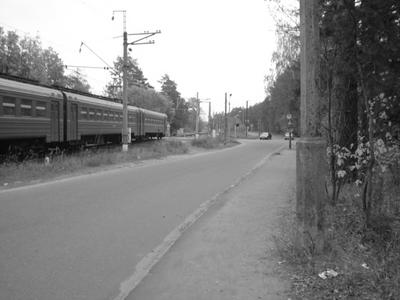
My conversation with Fyodor was itself a Cold War anecdote.
“…Dubnonium, its number 107 or something on the Mendeleev Table.”
“On the what table?”
“The Mendeleev Table of Elements.”
“Oh, the Periodic Table of Elements.”
America. Refusing to recognize the accomplishments of foreigners since 1783. [Mendeleev was a Russian physicist who first created our modern organizational system for the elements. The Russians named the table after him. Apparently, we didn’t see the need. Propaganda starts at home.]
The western end of the city includes about a half-dozen clusters of apartment towers, scattered along the main road and behind it. There will be 4 buildings, holding thousands of occupants, then empty land or trees for 600 meters, then another cluster. It was completely decentralized. Neighborhoods artificially planned and coordinated by some technocrat in the Kremlin, resulting in these pods of colonialism, of cleared forest and progress and triumph of nature. First the sickle, then the hammer.
Misha explained the plight of the town as it gets richer and stupider, as the New Russians buy up weekend apartments and take their ill-begotten money out to the country to escape the smog and assassins on the weekends. Science does not employ or pay what it used to, and so the scientists are drying up – not leaving, but just aging out of existence. Misha studied law at the University there. Bikes used to control the streets, now they are an afterthought to the occasional passing of Merc and Lexus SUVs. As late as the mid-90s, a theft of a bicycle would be newsworthy. In August, someone was shot outside their apartment building, and it went almost unmentioned in the paper. Its not that its common, its just no surprise that the city is not what it once was. New Russians even wash their dirty laundry in the provinces.
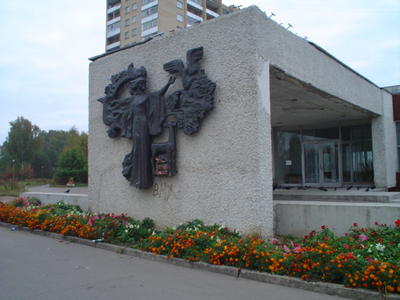
Misha pointed out some of the sights. “This is the place where you get married.” Not a church. Definitely not a church. In fact, it was a completely secularized place for a wedding. There wasn’t a cross to be found. The wall of the terraced entryway was adorned with an iron Greek goddess. It was Saturday, and there were weddings that day. The cars in the lot around it were all decorated rod-straight white, blue and red ribbons and balloons, emblematic of the Russian flag. The bride and groom were dressed as if it were any other Christian ceremony, but there was no Christ to be found. There was wedding cake and photographers and gowns and flowers. But there was no priest. No cross. It was fascinating. The Soviets completely removed the Christian aspect of the wedding ceremony – weddings were to be for creating little Commies, nothing more. And it stuck. Amazed. After the ceremony, the wedding party went out to the riverfront near the wedding hall and started drinking cheap beer in their gowns and suits. Love it.
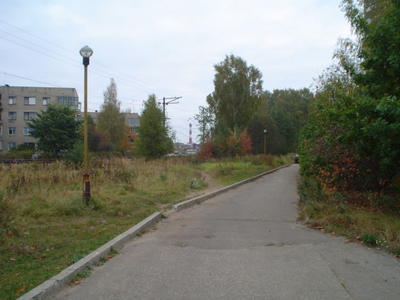
The sign in the center of town which welcomes you to the old commune side of the city was of a nuclear particle enveloping the name of the city. Beyond it was a café, flower shop and a convenience store, then an attempt at a modern laboratory, then a kilometer of forest. Out of the forest rose a red and white candy cane painted smokestack, emerging from the depth of a rusty smoldering industry.
“What is that?”
“I don’t know what you call it in America. It is the heater.”
“You mean, the heater?”
“Yeah.”
“Misha, we don’t have those.”
In Russia, all heating is centralized and is under the control of the central government. You don’t get heat until some bureaucrat in Moscow decides you need it. This is how the Soviets did it, and it remains today. Thus, these huge power-plant looking ‘heaters’ exist all over the country, providing heat for an entire city from one central orifice. It looked like an incinerator to me. Take trash, make far. Sounds commie to me. I explained to the fantastically confused Russian that in the US, each individual building or house will have its own independent heating system, and will have total control over installation, maintenance and fuel, will decide when to turn it on or off, and will be able to adjust the temperature.
“That’s pretty inefficient.”
“You’re damn right.”
“What happens if you can’t buy gas?”
“You die.”
The laboratory and heater system probably ran on energy derived from the monolithic dam which strode across the Volga River just above the city, creating a massive reservoir behind it and gererating enough electricity for this city of 70,000. It helps that the place doesn’t sprawl in the least – Dubna has the same population as Portland, though the whole place could fit onto either bank of Portland harbor and only up to the crest of the hill. There are no houses – only apartment buildings with stores on their lowest levels. This is also the only place where I had seen construction outside of Moscow. Dubna was a growing city in a shrinking country. [Russia has had sustained falling population each year since the early 1990s.]
The ‘old’ part of town, noting that it was completely built only 50 ago, featured these old communal style farmhouses, interspersed among them was a small bar or a store in the lower level of an old empty lab. The buildings were curious impersonations of European intuitions or Colonial American homes. It was similar to what you’ve known all your life, but completely unfamiliar.
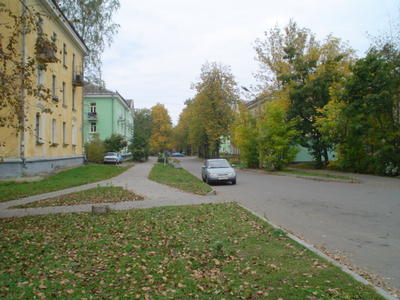
Later, Misha and I enjoyed The Big Lebowski, which Rachel had sent him from the States just that week. The last time I watched that movie I was with friends in Charleston South Carolina. I explained the more intricate concepts of Americana, such as: “at least I’m house broken,” “the bums lost, Lebowski!” and “this aggression will not stand, man.” Its the stupidest movie I’ve ever loved.

0 Comments:
Post a Comment
<< Home